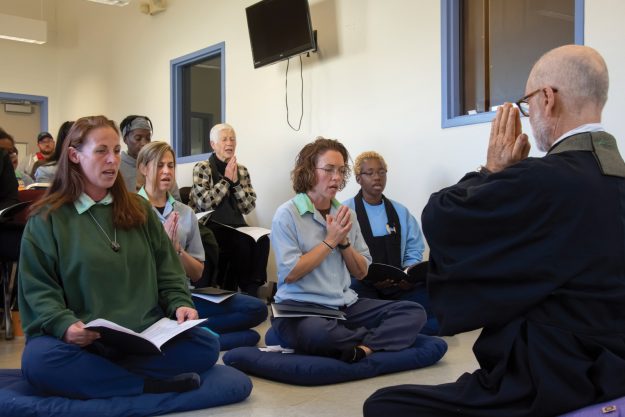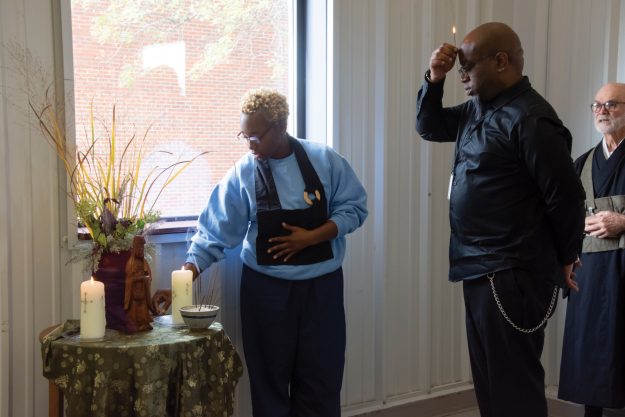Erica Orta and Kerry Vadasz, inmates at the Ohio Reformatory for Women, received the sixteen bodhisattva precepts in October 2019 in a formal commitment to Zen practice. This was the fourth jukai (literally, “receiving the precepts”) held at the prison since 2012, when Laura Taylor, who has been serving a life sentence since she was 17, became the first inmate to take the precepts, Buddhism’s guidelines for ethical conduct.
Here, the three women reflect on the obstacles they face as Zen practitioners in prison. Tricycle’s interview questions were relayed by chaplain Katie Egart of the Yellow Springs Dharma Center, who is their teacher.
What were some of the obstacles—physical and mental—that made it difficult to start practicing Zen in prison?
Laura Taylor (LT): I had so much guilt and shame before I started practicing. I felt like I didn’t have the right to be free, not just out in society but emotionally, too. I was also terrified that if I let my guard down and lived with an open heart, I couldn’t survive in a place where life is truly survival of the fittest, where you’re applauded for grappling to the top.
I was also afraid of being alone. I was afraid that if I immersed myself in the practice I would be completely separate from everyone. I wanted not to be aware that I was hurting people and that they were hurting me. I was afraid of clarity.
Erica Orta (EO): I struggled with my self-worth and wondered if I was even good enough for the practice. I still struggle; when difficult situations come up here, while my first thought might not be a defensive thought, that’s still in the top five. I handle things with more equanimity now, but I still question myself: Are you really able to follow the precepts? Look who you were.
“Anybody who is incarcerated wants to be free. This is freedom. It’s a way to be free.”My ego also wanted to instill the fear that “people are gonna think you’re weird, they’ll laugh at you,” and it was very hard for me to sit publicly at first, having to do it in a dorm where people are watching. Embarrassment would always arise in me. Like Laura said, in order to survive here, sometimes it feels as if you have to tap into that old nature that used to help you on the streets. That’s where the precepts come in, and you go back to the breath. Those are our reminders that you don’t have to react.
Kerry Vadasz (KV): I struggled with feeling like I wasn’t good enough and with a deep fear of failure. I know now that these feelings were born out of being in abusive situations in my past. It took me so long to make my decision to pursue Zen, because I was questioning my ability to make good decisions. Being able to sit through all that hesitation and uncertainty was extremely difficult.

How did you face these challenges?
LT: Sitting day after day helped tremendously. I learned how to open myself to people and even to the conflict that happens in here. One time I ended up in a physical altercation with a woman; she pushed me and I fell back, into another inmate. What surprised me was that I could see her as she was—it never crossed my mind to hit her back. I was able to be very aware of what I was feeling in the moment. The practice had accumulated enough for me to see what was happening—it wasn’t either of us—it was something happening, like a thought.
That was an extreme case, but it showed me that practice works and helped me to disregard the fear that Zen Buddhism would make me into a sitting duck.
What advice do you have for other incarcerated people who want to take up meditation?
KV: We have this misconception that if we meditate our mind is going to become clear, like nothing but empty space, that everything is going to fall away, but that never happens. When you’re watching your mind, you’ll see that it’s chaos.
EO: The simplest way to put it is that your thoughts will never stop. Just always come back to the breath. As long as you can do that, you’re meditating.
LT: I would say, just do it. I also suggest trying to find a teacher. I read books for a long time, which was a form of practice, but having an actual teacher pushes you along so much faster.
Pretty much anybody who is incarcerated wants to be free. This is freedom. It’s a way to be free. I want to remind everyone: there are a lot of people out in society who aren’t free.

Do you sit every day? Where do you sit?
EO: I do sit every day. Sometimes I sit in the quiet area; sometimes I sit on my bed. The time varies, but it’s no less than 10 minutes a day. I definitely make it a point to do it every single day.
If I don’t, I know what will happen: I’ll take another day off, and then another day off, and so forth.
KV: I try my best to sit every single day. There are days that I miss, but when I remember, it’s like, “Oh my God, I haven’t sat.” I’ll often sit on my bed, or at work in the greenhouse. I’m a floor sitter—sometimes as I sit, I’ll make it look like I’m staring out the window or watching TV or something like that.
LT: I sit every day. I sit on my bed. The only times I don’t sit on my bed are when I have an appointment somewhere else; in that case, I sit wherever I am. Or I stand. My goal is usually 20 minutes every day—I don’t go under 20 minutes.
How does your Buddhist practice help you actualize your goals in life?
EO: What I hope for in the future is to be free. I used to think that I deserved to be here forever, but I no longer feel that way. When I leave here, I hope to become a naturopathic doctor; I really want to help heal people. My practice is what helps me instill compassion and non-judgment into how I act. It allows me to be of benefit to others.
LT: I would like freedom, to be back out in society. Even so, Buddhism helped me to accept where I am and also see something different from where I am. I realized that if this was my fate—to die in prison, to never be released—I needed to ask myself: how can I be of benefit to the people around me, instead of mourning what I feel has been taken, what I gave up, or what has been lost? Zen practice changed my whole world, changed everything. It gave me life.
♦
You can read more about Laura Taylor, Erica Orta, Kerry Vadasz and their journey to become formal Zen students in this article from October 2019.